Reading From Śrīmad-Bhāgavatam, 10th Canto, chapter 20
To enhance the description of Lord Kṛṣṇa’s pastimes, Śrī Śukadeva Gosvāmī, the narrator of the Srimad Bhagavatam, describes in this chapter the beauty of Vṛndāvana, the rural village where Krishna grew up, during autumn and the rainy season. In the course of his presentation, he gives various charming instructions in metaphorical terms.
The rainy season began, giving life and sustenance to all living beings. The sky, covered by dense blue clouds, rumbled with thunder, and lightning flashed in the horizon.
Thus the sky and its natural illumination was covered in the same way that the spirit soul is covered by the three modes of material nature.
With its rays, the sun had, for eight months, drunk up the earth’s wealth in the form of water. Now, that the proper time had arrived, the sun began releasing this accumulated wealth.
Flashing with lightning, great clouds were shaken and swept away by fierce winds.
Just like merciful persons, the clouds give their lives for the pleasure of this world.
The earth, emaciated by the summer heat, becomes fully nourished again when moistened by the rain god. Thus the earth is like a person whose body becomes emaciated by austerities for wealth, and then becomes fully nourished when they achieve the fruit of their penance.
In the evening twilight during the rainy season, in the darkness, the glowworms shine but not the stars in the sky.
Just as in this Age, the predominance of bad activities allows atheistic doctrines to overshadow the true knowledge of the Vedas.
The frogs, who all along lay silent, suddenly begin croaking when they hear the rumbling of the rain clouds. In the same way, student monks, who perform their morning duties in silence, begin reciting their lessons when called by their teacher.
With the advent of the rainy season, the dried up insignificant streams, begin to swell and stray from their path, like the body, property and money of a man controlled by the urges of his senses.
The earth turns emerald green from the newly grown grass, the tiny Indragopa insects added a reddish hue, and white mushrooms add texture and circles of shade.
Thus the earth appears like a person who suddenly becomes rich.
The fields give joy to the farmers from the wealth of grains. But those same fields give remorse in the hearts of those who were too proud to engage in farming and who failed to understand how everything is under the control of the Supreme.
As all creatures of the land the water takes advantage of the newly fallen rainwater.
Their forms become attractive and pleasing, just as a devotee becomes beautiful by engaging in the service of the Supreme Lord.
Where the rivers join the ocean, the waters are agitated and the waves are blown about by the wind, just as the mind of an immature yogī is agitated because he is still tainted by lust and attached to the objects of the senses.
Just as devotees whose minds are absorbed in the Personality of Godhead remain peaceful even when attacked by all sorts of danger, the mountains in the rainy season are not at all disturbed by the repeated striking of the rain-bearing clouds.
During the rainy season the roads become covered with grass and debris and are difficult to follow.
These roads are like religious scriptures that brāhmaṇa priests no longer study and that thus become corrupted with the passage of time.
Like the curved bow of Indra that appears in the sky [the rainbow], which is different from ordinary bows that are bent by a string, the Supreme Lord appears in this world unlike ordinary people because He remains free from all material qualities and is independent of all material conditions.
During the rainy season the moon is prevented from appearing by the covering clouds, which are themselves illumined by the moon’s rays.
Similarly, the living being is prevented from appearing directly by the covering of the false ego, which is itself illumined by the consciousness of the pure soul.
The peacocks are festive and cry out a joyful greeting when they see the clouds arrive, just as people distressed in life feel pleasure when the pure devotee of the infallible Supreme Lord visit them.
The trees have grown thin and dry, but after they drink the newly fallen rainwater through their feet, their various bodily features blossom.
Similarly, one whose body has grown thin and weak from austerity again exhibits his healthy bodily features upon enjoying the material objects gained through that austerity.
The cranes dwell on the shores of the lakes, although the shores are agitated during the rainy season, just as materialistic persons with contaminated minds always remain at home, despite the many disturbances there.
When Indra sends his rains, the floodwaters break through the irrigation dikes in the fields, just as the atheists’ false theories break down the boundaries of Vedic understanding.
By the winds, the clouds release their nectarean water for the benefit of all living beings, just as kings, instructed by their brāhmaṇa priests, dispense charity to the citizens.
The Vṛndāvana forest is resplendent, filled with ripe dates and jambu fruits, Kṛṣṇa, the divine youth, surrounded by His cows and cowherd boyfriends and accompanied by Śrī Balarāma, his brother, enter that beautiful forest to play.
The cows move slowly because of their weighty milk bags, yet they quickly run to Krishna, the supreme person, as soon as He calls them. Their affection for Him causes their udders to become wet with milk.
Krishna saw the joyful aboriginal girls of the forest, the trees dripping sweet sap, and the mountain waterfalls, whose resounding sound indicates that there are caves nearby.
When it rains, Krishna would sometimes enter a cave or the hollow of a tree to play and to eat roots and fruits.
Krishna would take His meal of boiled rice and yogurt, sent from home, in the company of Saṅkarṣaṇa, or Balaram, his brother, and the cowherd boys who regularly eat with Him. They would all sit down to eat on a large stone near the water.
Krishna watched the bulls, calves and cows sitting on the green grass, grazing with closed eyes, tired from the burden of their heavy milk bags. Enjoying the beauty and opulence of Vṛndāvana’s rainy season, a perennial source of great happiness, Krishna offered all respect to the season, like all things in this universe, which originated from Krishna’s very self.
As Balarama and Krishna spent their days in the Vṛndāvana forest, the fall season arrived with its cloudless sky, clear water and the gentle wind.
The autumn season brings lotus flowers, also calms the lakes and ponds of water to their original purity, just as the process of devotional service purifies the minds of the fallen yogīs when they return to it.
Autumn clears the sky of clouds, lets the animals out of their crowded living conditions, cleans the earth of its mud, and purifies the water of contamination, in the same way that loving service rendered to Lord Kṛṣṇa frees the members of the four spiritual orders from their respective troubles.
The clouds, having given up all they possessed, shine with purified effulgence, just like peaceful sages who give up all material desires and are thus free of all sinful propensities.
In Autumn the mountains release their pure water and sometimes do not, just as experts in transcendental science sometimes give the nectar of transcendental knowledge and sometimes do not.
The fish, do not understand the shallow water is decreasing, just as foolish men cannot see how the time they have left to live is diminishing with every passing day.
Gradually the land gives up its muddy condition and the plants grow past their unripe stage, in the same way that sober sages give up egotism and possessiveness. These are based on things different from the real self, namely, the material body and its by-products.
With the arrival of autumn, the ocean and lakes become silent, their water still, just like a sage who stops all material activities and gives up his recitation of Vedic mantras.
In the same way that the practitioners of yoga bring their senses under strict control to stop their consciousness from flowing out through the agitated senses, the farmers erected strong mud banks to keep the water within their rice fields from draining out.
Free of clouds and filled with clearly visible stars, the autumn sky shines brilliantly, just like the spiritual consciousness of one who has directly experienced the purport of the Vedic scriptures.
Except for the young gopīs girls, whose hearts are stolen by Krishna, people could forget their suffering by embracing the wind coming from the flower-filled forest. This breeze was neither hot nor cold.
O King Parīkṣit, when the autumn sun rose, all the lotus flowers blossomed happily, except the night-blooming kumut, just as in the presence of a strong King everyone becomes fearless, except the thieves.
In all the towns and villages people held great festivals and followed local custom and traditions for honoring the first grains of the new harvest.
Thus the earth, rich with newly grown grain and are especially beautified by the presence of Kṛṣṇa and Balarāma flourished.

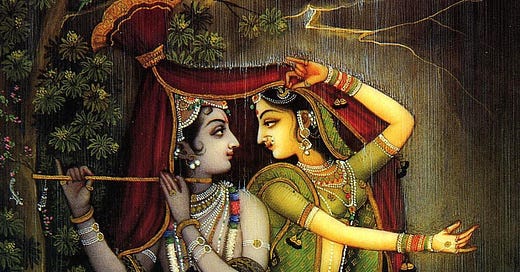




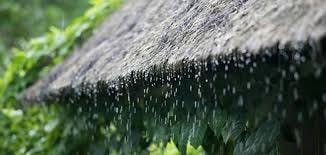
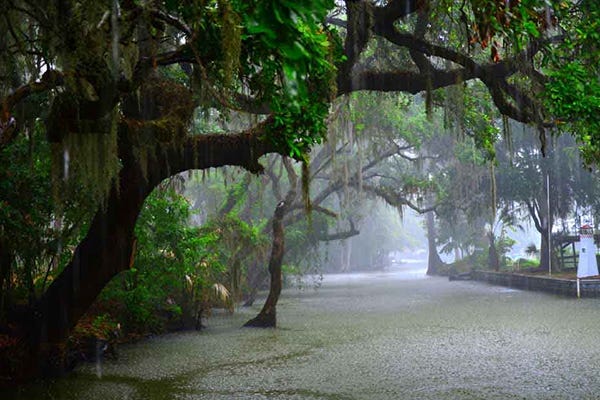
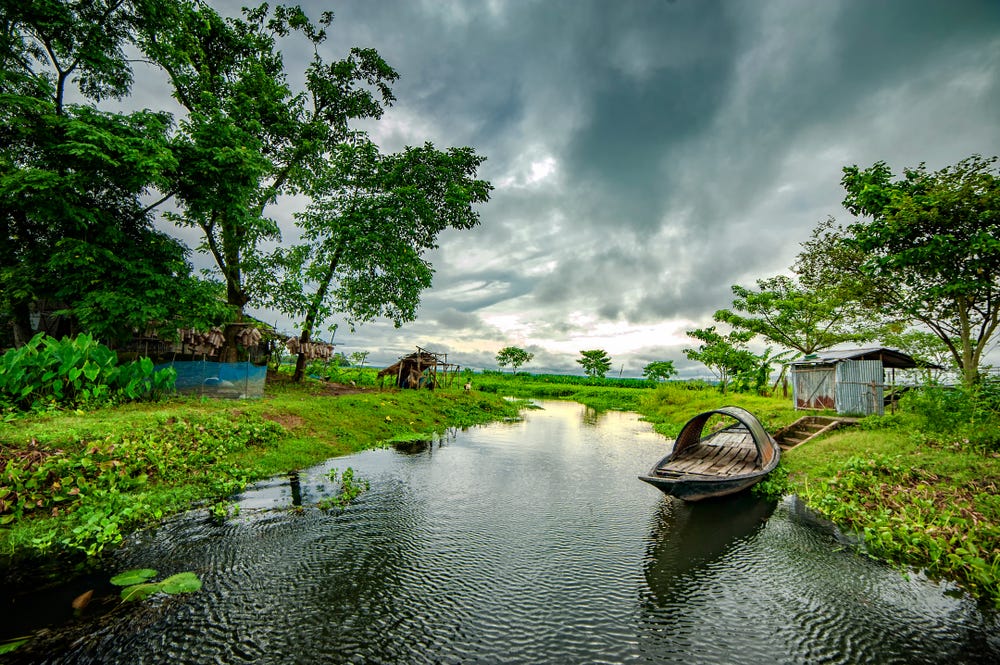
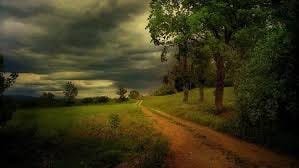
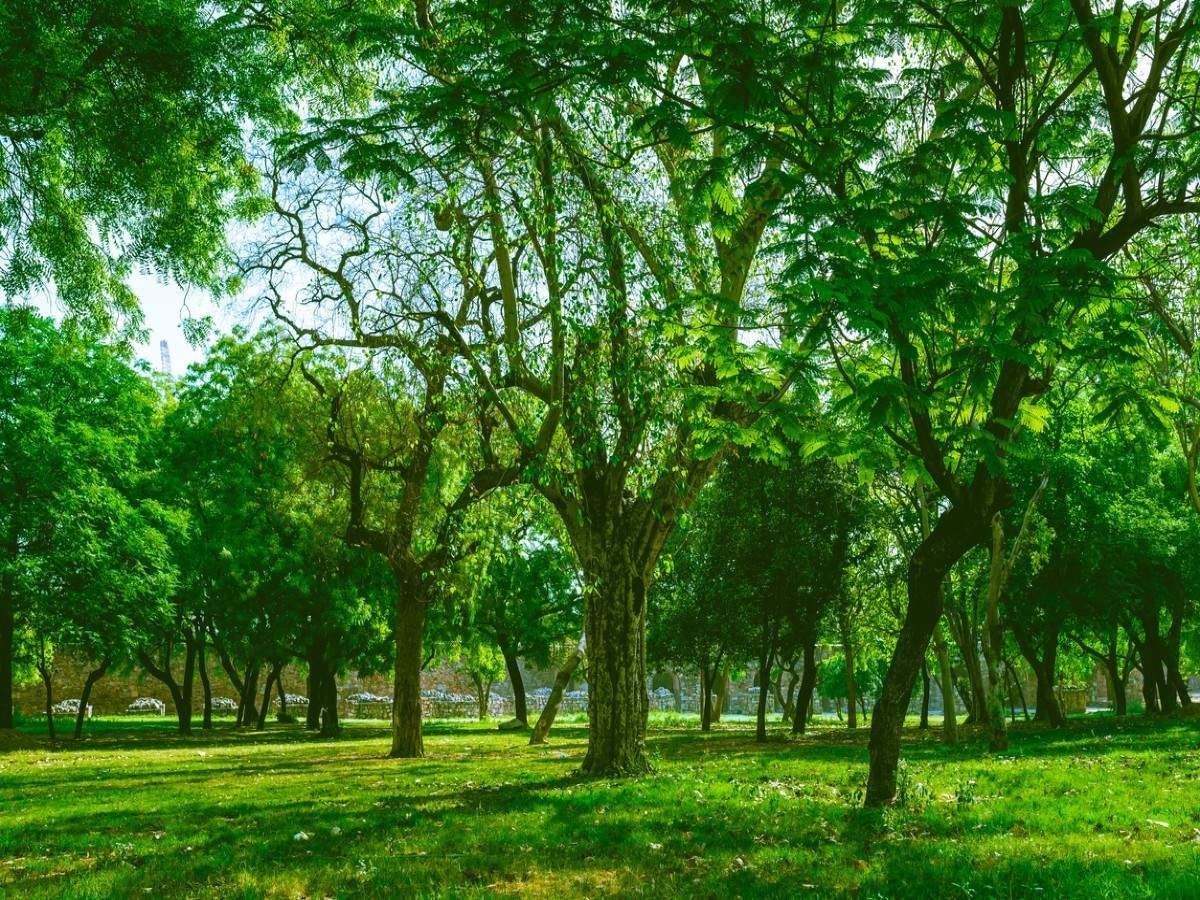
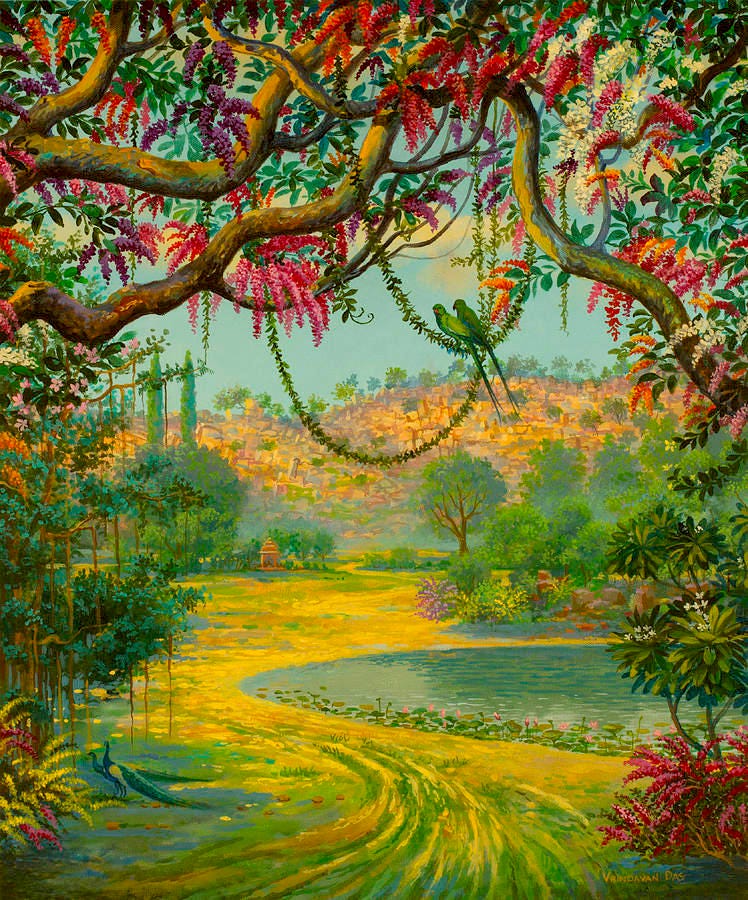
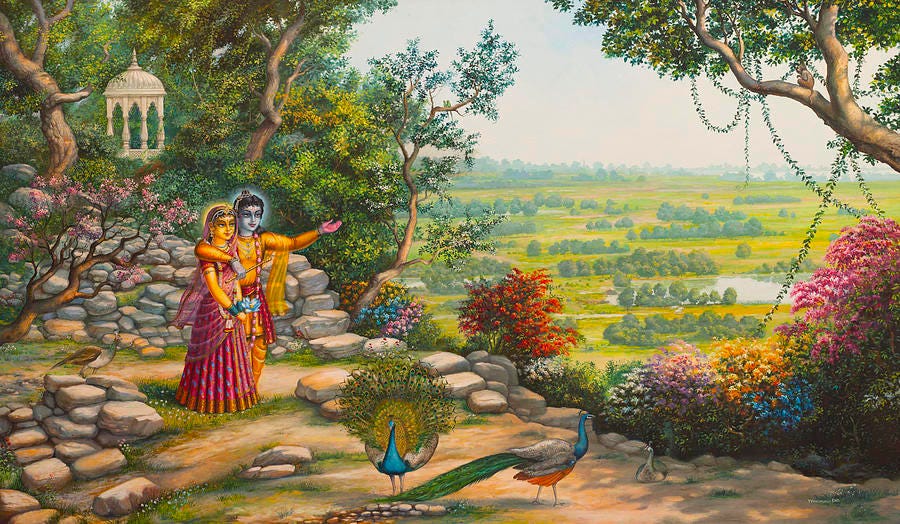
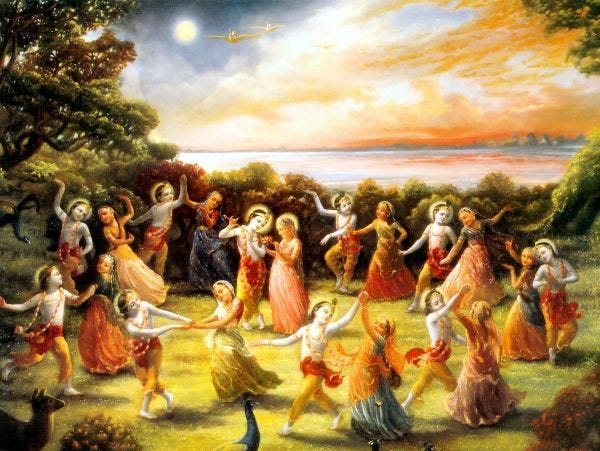
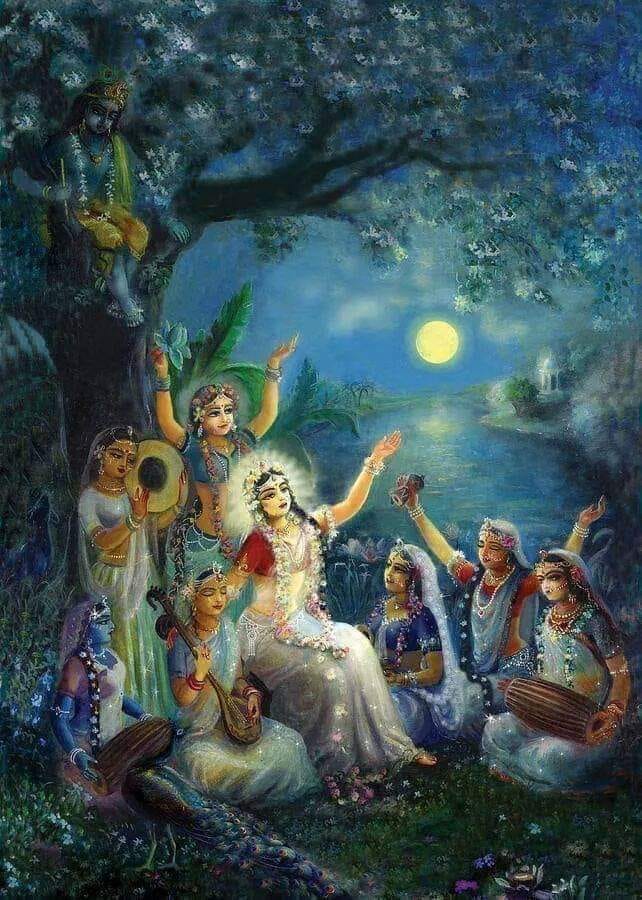




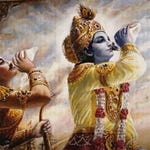
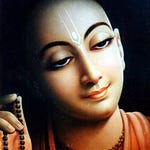
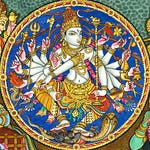


Share this post